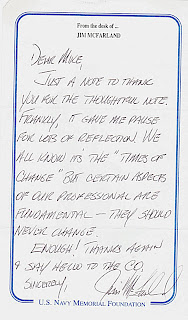The
following memorandum has been reproduced countless times by military and
civilian organizations since World War II and has become a widely accepted
definition of what effective staff members do. The original source of the
memorandum is unclear. Some reports indicate that the memo was issued in
January 1942 by the Provost Marshal General, U.S. Army. It has also been
attributed to Brigadier G.E.R. Smith, a member of the Royal Canadian Army, who
released it in 1943, while he was serving as Deputy Director of Supplies and
Transport, First Canadian Army.
COMPLETED
STAFF WORK
1 The doctrine of “completed staff work”
will be the doctrine of this office.
2 “Completed Staff Work” is the study of a
problem, and presentation of a solution, by a staff officer, in such form that
all that remains to be done on the part of the head of the staff division, or
the commander, is to indicate his approval or disapproval of the completed
action. The words “completed staff action” are emphasized because the more
difficult the problem is the more the tendency is to present the problem to the
chief in piece-meal fashion. It is your duty as a staff officer to work out the
details. You should not consult your chief in the determination of those
details, no matter how perplexing they may be. You may and should consult other
staff officers. The product, whether it involves the pronouncement of a new
policy or affect an established one, should when presented to the chief for
approval or disapproval, be worked out in finished form.
3 The impulse which often comes to the
inexperienced staff officer to ask the chief what to do, recurs more often when
the problem is difficult. It is accompanied by a feeling of mental frustration.
It is so easy to ask the chief what to do, and it appears so easy if you do not
know your job. It is your job to advise your chief what he ought to do, not to
ask him what you ought to do. He needs your answers, not questions. Your job is
to study, write, restudy and rewrite until you have evolved a single proposed
action – the best one of all you have considered. Your chief merely approves or
disapproves.
4 Do not worry your chief with long
explanations and memoranda. Writing a memorandum to your chief does not
constitute completed staff work, but writing a memorandum for your chief to
send to someone else does. Your view should be placed before him in finished
form so that he can make them his views by simply signing his name. In most
instances, completed staff work results in a single document prepared for the
signature of the chief, without accompanying comment. If the proper result is
reached, the chief will usually recognize it at once. If he wants comment or
explanation, he will ask for it.
5 The theory of completed staff work does
not preclude a “rough draft”, but the rough draft must not be a half-baked
idea. It must be completed in every respect except that it lacks the
requisite number of copies and need not be neat. But a rough draft must not be
used as an excuse for shifting to the chief the burden of formulating the
action.
6 The “completed staff work” theory may
result in more work for the staff officer, but it results in more freedom for
the chief. This is as it should be. Further, it accomplishes two things:
a. The chief is protected from half-baked ideas,
voluminous memoranda, and immature oral presentations.
b. The staff officer who has a real idea
to sell is enabled more readily to find a market.
When you have
finished your “completed staff work” the final test is this: If you were
the chief would you be willing to sign the paper you have prepared, and stake
your professional reputation on its being right? If the answer is
negative, take it back and work it over because it is not yet “completed staff
work.”













